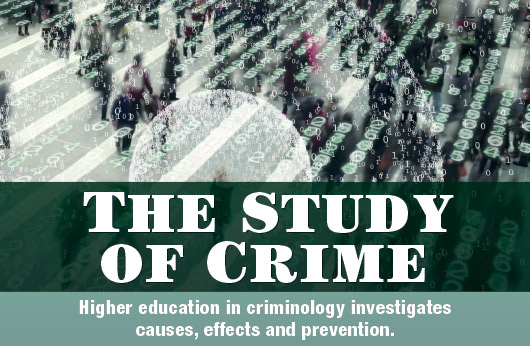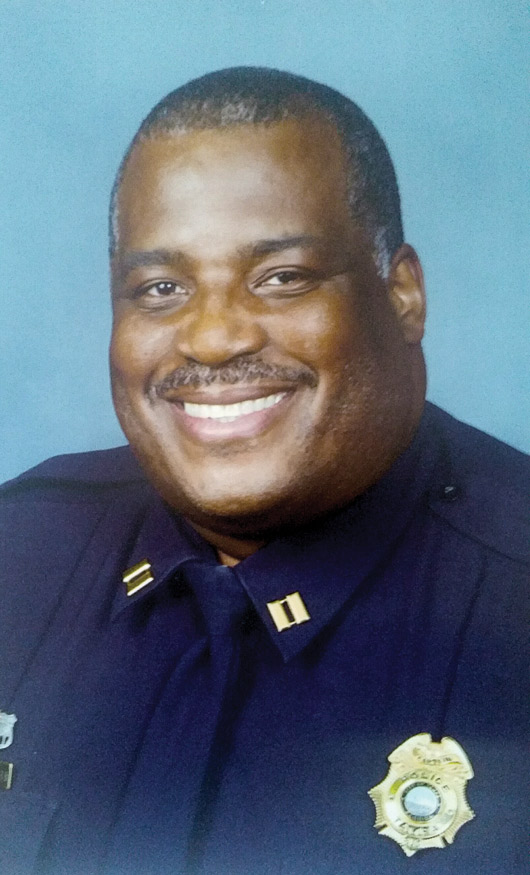
For the general public, the primary purpose of policing is to enforce the laws. Of course, those working in the field know that criminal cases aren’t always clear-cut whodunits. Officers and detectives must consider an array of factors — for example, victimology may play a role in an investigation, and a community’s cultural or economic characteristics can influence a case. The study of these broader forces is criminology, which combines principles of psychology, sociology and law to scientifically examine criminal behavior, the justice system and crime prediction and deterrence. Understanding how these dynamics affect the job of law enforcement professionals helps to improve individual, agency and government responses to crime. A degree in criminology can prepare you for a leadership role in your department or a specialized position researching and analyzing data as a criminologist, as well as offering the potential to influence policymaking or teach the next generation of peace officers.
Degree: Bachelor of Science in Criminology and Criminal Justice
Course sampling: Introduction to Corrections, White Collar Crime
Why choose it? Students benefit from experienced professors who are highly regarded in their fields, as well as input from subject-matter experts who continue to practice professionally. Topics covered include gangs, fraud, corrections and courts.
Faculty insight: “Students working within law enforcement have the opportunity to interact with scholars familiar with the realities of domestic violence, sex crimes, domestic and international terrorism, homeland security, white collar and organized crime, sophisticated money laundering, gangs and narcotics investigations.” — Rebecca Loftus, Ph.D., academic program manager and director of Israel Counter-terrorism Study Abroad Program
 “There are a variety of classes offered for the degree. The leadership development courses I have really enjoyed; they have been tremendously helpful. There are also classes on gender and crime. [They] dissect gender roles in crime, such as domestic violence or targeting females as perpetrators.”
“There are a variety of classes offered for the degree. The leadership development courses I have really enjoyed; they have been tremendously helpful. There are also classes on gender and crime. [They] dissect gender roles in crime, such as domestic violence or targeting females as perpetrators.”
Jacksonville Sheriff’s Office,
B.S. in Criminology and Criminal Justice student
 Degree: Master of Science in Criminal Justice, Criminal Behavior Concentration
Degree: Master of Science in Criminal Justice, Criminal Behavior Concentration
Course sampling: Mental Health Law in Criminal Behavior, Criminogenic Psychopathology
Why choose it? This program brings together faculty with years of practical and operational experience and students who are working professionals, creating a collaborative learning environment. The criminal behavior concentration empowers students to dissect crisis interventions, understand psychopathology and fine-tune research methods. Offered only through online courses, the concentration is formatted to allow enrollees to finish in three semesters.
Faculty insight: “Educated officers typically are exposed more to a diverse society and demonstrate better reading, writing, critical thinking and retention skills.” — Kevin Cashen, CLEE, dean, School of Criminal Justice and Social Sciences
Degree: Master of Science in Criminology
Course sampling: Contemporary Issues in Criminology, Cyber Criminology
Why choose it? Students can complete this graduate-level degree in 24 months by taking at least one course each eight-week academic period. Curriculum emphasizes analytical techniques to better predict and prevent crime, as well as to develop policing policies.
Faculty insight: “In lieu of the thesis or capstone paper, we offer students an internship. One student recently took an internship with the Colorado Bureau of Investigation (CBI). They were so impressed, they hired her. ” — Don Lindley, Ph.D., associate professor
Degree: Master’s in Criminology
Course sampling: Applied Statistics in Criminology, Prevention and Treatment of Crime and Delinquency
Why choose it? Online classes are crafted to provide the same caliber of educational opportunities offered to on-campus students. Coursework covers a breadth of topics, such as the effect of race and ethnicity on the justice system or how to incorporate organizational theories.
Faculty insight: “We view our online programs as extensions of our on-campus programs. Plus, to save our distance-learning students time and money, there are no Graduate Record Exam requirements and no out-of-state tuition fees.” — Kevin Beaver, Ph.D., director of distance learning
 “Criminology helps us evaluate what we do, how we do it and why we do it. For example, we read essays from incarcerated people about why they’re [in prison]. It was enlightening. [Incarceration] can take a family down an economic rung, and they may never recover.”
“Criminology helps us evaluate what we do, how we do it and why we do it. For example, we read essays from incarcerated people about why they’re [in prison]. It was enlightening. [Incarceration] can take a family down an economic rung, and they may never recover.”
Special Operations Division, Tampa Police Department,
Online Master’s in Criminology student
Degree: Bachelor of Science in Criminology
Course sampling: Crime and Violence in America, Directed Policing
Why choose it? Enrollees select one of four concentration options: victimology, corrections, law enforcement or forensic behavioral sciences. Working professionals can attend the off-campus program, which offers online classes and in-person receptions where faculty, administrators, students and alumni network.
Faculty insight: “We work with various law enforcement agencies through federal grants, and it’s very valuable for our students to get to interact with professionals who present to the court or district attorney’s office or juvenile justice [agencies].” — Harold Otto Schweizer, Ph.D., professor, law enforcement option coordinator and interim internship coordinator




